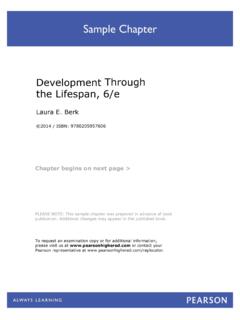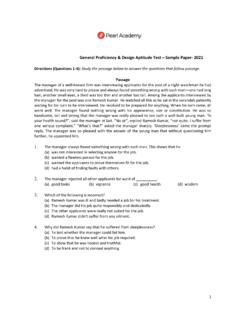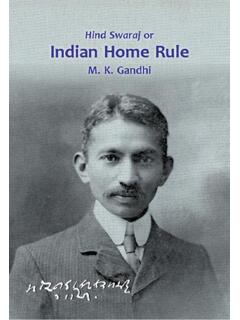Transcription of HISTORICAL AND PHILOSOPHICAL FOUNDATIONS OF …
1 HISTORICAL ANDPHILOSOPHICALFOUNDATIONS 12/1/09 5:32 PM Page 12/1/09 5:32 PM Page iiFifth EditionHISTORICAL ANDPHILOSOPHICALFOUNDATIONS OFEDUCATIONA BIOGRAPHICALINTRODUCTIONG erald L. GutekLoyola University ChicagoBostonColumbusIndianapolisNew YorkSan FranciscoUpper Saddle RiverAmsterdamCape TownDubaiLondonMadridMilanMunichParisMon trealTorontoDelhiMexico CitySao PauloSydneyHong 12/1/09 5:32 PM Page iiiPhoto Credits: Courtesy of the Library of Congress, pp. 9, 94, 107, 128, 157, 180, 201, 223, 264, 284, 307, 325, 343, 428; Fasiliki , p. 30; Snezana , p. 50; Bettmann/Corbis, All Rights Reserved, p. 67; Reproduced fromthe collections of the National Archives, p. 79; Hulton Archive/Getty , p.
2 138; Indiana HISTORICAL Society, p. 246;Wisconsin HISTORICAL Society, WHI-2761, p. 369; Courtesy of the Centenary of the Montessori Movement, p. 386; Copyright: VithalbhaiJhaveri/GandhiServe/Library of Congress, p. 409; Courtesy of the Insituto Paulo Freire, Paulo Archives, p. effort has been made to provide accurate and current Internet information in this book. However, the Internet and informationposted on it are constantly changing, so it is inevitable that some of the Internet addresses listed in this textbook will 2011, 2005, 2001, 1997, 1991 Pearson Education, Inc., Upper Saddle River, New Jersey 07458. All rights in the United States of America. This publication is protected by Copyright, and permission should be obtained from thepublisher prior to any prohibited reproduction, storage in a retrieval system, or transmission in any form or by any means, electronic,mechanical, photocopying, recording, or likewise.
3 To obtain permission(s) to use material from this work, please submit a written requestto Pearson Education, Inc., Permissions Department, 501 Boylston Street, Suite 900, Boston, MA, 02116, fax: (617) 671-2290,email: of Congress Cataloging-in-Publication DataGutek, Gerald and PHILOSOPHICAL FOUNDATIONS of education: a biographical introduction / Gerald L. Gutek. 5th bibliographical references and 978-0-13-715273-51. Educators Biography. 2. Education History. 3. Education Philosophy. I. '2 dc22[B]200904670310 9 8 7 6 5 4 3 2 1 ISBN 10:0-13-715273-6 ISBN 13: 978-0-13-715273-5 Vice President and Editor in Chief:Jeffery W. JohnstonAcquisitions Editor:Meredith D. FosselEditorial Assistant:Nancy HolsteinVice President, Director of Marketing:Quinn PerksonMarketing Manager:Chris BarrySenior Managing Editor:Pamela D.
4 BennettSenior Project Manager:Mary M. IrvinSenior Operations Supervisor:Matt OttenwellerSenior Art Director:Diane LorenzoCover Designer:Jeff VanikCover Art:ShutterstockPhoto Coordinator:Lori WhitleyFull-Service Project Management:S4 Carlisle PublishingServicesComposition:S4 Carlisle Publishing ServicesPrinter/Binder and Cover Printer:Bind Rite-RobbinsvilleText 12/2/09 11:11 PM Page ivFor my grandchildren, Claire, Abigail, Luke,and Drew Swiatek and Mills and Anna Hope 12/1/09 5:32 PM Page 12/1/09 5:32 PM Page viviiPREFACEH istorical and PHILOSOPHICAL FOUNDATIONS of Education: A Biographical Introductiondevelopedfrom my more than three decades of teaching the history and philosophy of education at LoyolaUniversity Chicago and as a visiting professor at Northern Michigan University, OtterbeinCollege, and the University of Glasgow in Scotland.
5 I continue to learn from my students in theinternational education programs offered by Framingham State College in Massachusetts. Overtime, the identification of the biographies and development of the chapters were stimulated bydiscussions with my students. The book reflects my belief that educational biography is a valu-able, powerful, but often-neglected medium for preparing teachers, administrators, and otherprofessionals in education. I hope the book s fifth edition will continue to focus more attentionon the use of educational biography in professional education AND COVERAGEThe book is organized on three broad themes: major movements in world history and education,the biographies of leading educators, and the philosophies and ideologies that these educatorsconstructed as they interacted with their HISTORICAL organized the book around the major movements in world and Western history.
6 The age ofConfucius in ancient China, the classical philosophies of ancient Greece and Rome, the scholasti-cism of the Middle Ages, the humanism of the Renaissance, the theologies of the ProtestantReformation, the eighteenth-century Enlightenment, the FOUNDATIONS of the United States, the in-dustrial revolution, the rise of ideologies, the progressive movement, the end of imperialism in thepostcolonial world, the rise of African American consciousness, and the development of liberationpedagogy. This periodization around broad HISTORICAL currents helps to construct a cognitive mapon which to locate people and events and construct a perspective on the past. I wanted the book snarrative to be enlivened by the lives that represented the efforts, trials and errors, and achievementsof those who shaped the history and philosophy of interest in biography the stories of lives provided a means to give the great move-ments of educational history a personal face.
7 Biography enables us to see ourselves through thelives of others. For each of the great movements in history, I identified an important contributorto educational philosophy and method. For ancient China, there was Confucius, an educatorwhose philosophy continues to be a powerful force on Asian culture. For ancient Greece andRome, there were Plato, the founder of idealism; Aristotle, the founder of realism; and Quintilian,an exemplary teacher of rhetoric. Medieval Christianity was epitomized by the great theologianThomas Aquinas. Erasmus was the ideal representative of Renaissance humanism. John Calvinand Johann Amos Comenius represented two different ways of interpreting the educationalchanges generated by the Protestant Reformation.
8 For the Enlightenment and post-Enlightenment eras, the figures of Jean-Jacques Rousseau and Johann Heinrich Pestalozzi standout in bold relief. For the age of revolution and republicanism, three persons Thomas Jefferson,Mary Wollstonecraft, and Horace Mann were leading characters. Jefferson made the intellectualconnection between the Enlightenment s rationalism and the republican impulse in NorthAmerica. Mary Wollstonecraft provided insights into the need for women s rights. Horace Mannwas a strong voice for creating public education for the new American republic. 12/1/09 5:32 PM Page viiresponses to the industrial and Darwinian revolutions came from such theorists as Robert Owen,a utopian socialist; John Stuart Mill, a liberal; and Herbert Spencer, a social Darwinist.
9 Earlytwentieth-century progressivism is exemplified by Jane Addams, founder of Hull House, andJohn Dewey, America s leading pragmatist philosopher. Friedrich Froebel, founder of the kinder-garten, and Maria Montessori, who created her own version of early childhood education, pro-vided new ideas about educating children. The attack on colonialism came from MohandasGandhi, who won India s independence by nonviolent resistance. W. E. B. Du Bois s commitmentto equality of persons signaled a rising African American consciousness that would lead to pan-Africanism. The liberation pedagogy of Paulo Freire encompassed important strands in con-temporary educational criticism such as neo-Marxism, existentialism, postmodernism, and crit-ical theory.
10 In the fifth edition, I have added a chapter on William C. Bagley, an often-overlookededucator who did much to shape teacher education in America and who represents a more tradi-tional educational posture in educational I examined the lives of the great educators in their HISTORICAL contexts, their views onphilosophy of education what constitutes the educated person surfaced and came into per-spective. I found that my students, too, gained deeper insights into philosophy of education bymaking connections with these founding figures. For example, an examination of Plato s ideasleads to a consideration of PHILOSOPHICAL idealism, Aristotle s ideas to realism, Thomas Aquinas toThomism, Erasmus to humanism, Comenius to pansophism, Rousseau to naturalism, Dewey topragmatism, Bagley to essentialism, and Freire to liberation found that the lives and ideas of certain key figures provided students with an under-standing of ideology and how ideology influences educational policy.

















